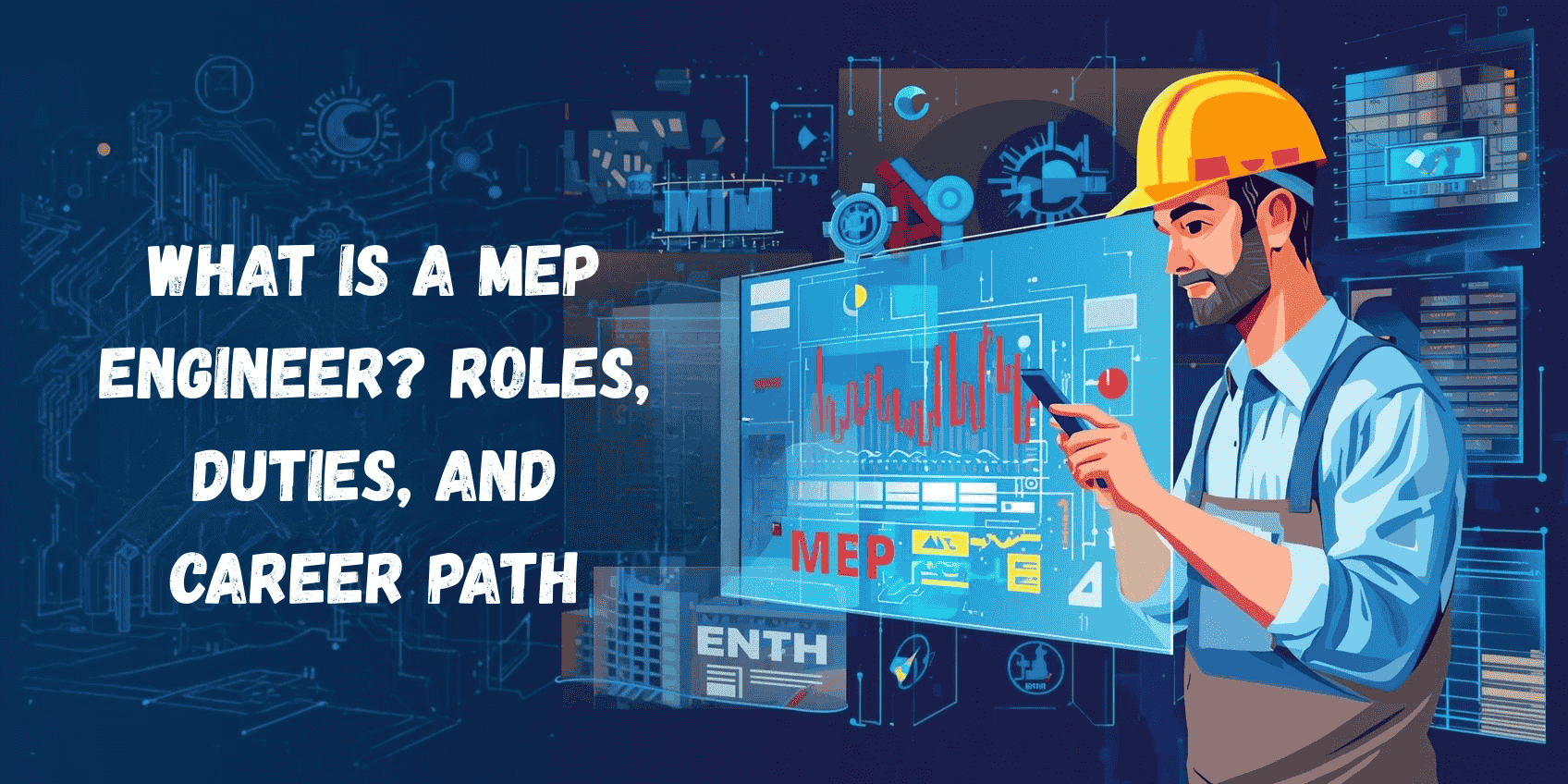
Learning pathways in MEP disciplines are expanding as professionals seek structured training options. The choice between digital platforms and classroom-based study directly influences both practical skills and long-term career outcomes. In the United States, an MEP engineer earns about $49 per hour, making specialized preparation an important factor for professional growth. When exploring course formats, clarity on what MEP is in construction provides the foundation for choosing the right program.
Selecting training also means understanding comparative strengths and trade-offs of delivery modes. Online programs may offer flexibility, while in-person sessions create space for technical immersion. Weighing the pros and cons of offline MEP training against digital learning allows professionals to match education with career goals and personal learning style.
Why do Professionals Consider MEP Training to Boost Their Careers?
In construction and building services, career growth depends on keeping technical knowledge up to date. Employers value engineers who can apply concepts directly to real projects rather than only understanding them in theory. Training bridges this gap by enhancing practical skills and structured problem-solving. When focused on the duties of an MEP engineer, these programs prepare professionals to meet industry standards and handle the demands of complex construction projects effectively.
Advancement in this field also depends on understanding how engineering responsibilities interact across multiple systems. Structured training provides guidance on safety, efficiency, and compliance while supporting collaboration with other disciplines. Linking these skills to the roles of a MEP engineer in construction helps professionals improve performance on current projects and build long-term career opportunities, making training an essential step in professional development.
What Are the Key Advantages of Online & Offline MEP Training Programs?
Both online and offline programs provide structured learning that aligns with the MEP engineer job description, helping professionals develop relevant skills and practical knowledge for construction projects.
Here are the advantages of online and offline MEP training programs:
|
Advantages of Online MEP Courses |
Advantages of Offline MEP Courses |
|
A flexible schedule allows learning at your own pace. |
Direct interaction with instructors and peers enhances understanding. |
|
Access to digital resources and recorded sessions for review. |
Hands-on experience with real equipment and practical setups. |
|
Can learn from anywhere, reducing travel and associated costs. |
Immediate feedback during exercises and on-the-spot problem solving. |
|
Modular courses allow focusing on specific MEP systems and skill areas efficiently. |
Collaborative classroom exercises strengthen teamwork and communication skills essential for projects. |
|
Self-paced quizzes and exercises enable repeated practice for mastery. |
Real-time problem-solving develops confidence in practical scenarios. |
|
Online forums and peer discussions support knowledge exchange and problem-solving. |
Networking opportunities with instructors and classmates build professional connections. |
Also Read: Top 50 MEP Interview Questions & Answers 2026
What Limitations Should You Be Aware of Online & Offline MEP Training Program?
While training programs offer valuable learning opportunities, each format also comes with certain limitations that professionals should consider. A well-structured MEP course guide can help learners identify potential challenges, ensuring they make informed decisions about which format aligns with their learning style and career objectives.
Limitations of online and offline MEP training programs:
|
Limitations of Online MEP Courses |
Limitations of Offline MEP Courses |
|
Limited hands-on experience with physical systems and equipment. |
A fixed schedule may conflict with work or personal commitments. |
|
Less direct interaction with instructors can slow the clarification of doubts. |
Travel and accommodation costs may add a financial burden. |
|
Requires strong self-discipline and time management to stay on track. |
Limited flexibility to review materials outside scheduled sessions. |
|
Reliance on stable internet and technology for uninterrupted access. |
Smaller variety of resources compared to digital platforms. |
|
Networking opportunities are mostly virtual and may feel less personal. |
Pacing may not suit learners who prefer self-directed study. |
|
Practical assessments may be restricted to simulations rather than real-world scenarios. |
Immediate problem-solving support outside sessions is limited. |
How to Decide Which Training Mode Suits Your Learning Style and Career Goals?
Choosing the right program requires evaluating your priorities and preferences, and understanding the benefits of different formats. A structured approach to career-focused MEP learning formats helps professionals select the mode that best aligns with their goals, practical needs, and personal learning style.
Key considerations for selecting the right training mode:
-
Assess your preferred learning style: self-paced online modules versus structured in-person sessions.
-
Consider your work schedule and flexibility requirements for study commitments.
-
Evaluate whether hands-on, practical experience is critical for mastering MEP systems.
-
Determine if training and networking opportunities enhance skills relevant for MEP jobs.
-
Review course content and specialization areas to ensure alignment with long-term career objectives.
Also Read: Major Projects Built on BIM MEP in India
Which Top Online MEP Training Providers Offer Quality Programs?

For professionals seeking to advance in MEP engineering, selecting the right training provider is crucial. A well-structured MEP education for busy professionals ensures that learning is both flexible and aligned with industry standards. Below are five reputable online platforms offering comprehensive MEP training programs:
1. Novatr
Novatr offers a 7-month BIM Course for MEP Engineers, an advanced, industry-accredited course for Mechanical, Electrical, Plumbing, and Fire-Fighting professionals. It provides practical exposure and a comprehensive BIM for MEP engineers to enhance real-world project skills.
2. LinkedIn Learning
LinkedIn Learning offers a variety of MEP courses, including HVAC, electrical, and plumbing systems. These courses are taught by industry experts and are suitable for professionals looking to deepen their understanding of MEP systems. The platform provides flexibility, allowing learners to study at their own pace.
3. Udemy
Udemy provides a range of MEP courses, such as Revit MEP 2026, catering to different skill levels. Courses are designed to help professionals master MEP design and drafting, with practical exercises and real-life applications. Udemy's platform is user-friendly, making it accessible for busy professionals.
4. VDCI
VDCI offers specialized Revit MEP courses that focus on building systems coordination and energy analysis. Their training is tailored for professionals in the AEC industry, aiming to enhance their proficiency in MEP design using BIM tools. The courses are comprehensive and cater to both beginners and advanced learners.
5. MEP Academy
MEP Academy provides articles, training, and information for the HVAC, Electrical, and Plumbing industries. Engineers and contractors in the commercial construction industry will find useful information to help them do their jobs. Their online resources are designed to support professionals in enhancing their MEP knowledge and skills.
Also Read: Boost Your MEP Engineering Career with BIM Mastery
USPs of Novatr's BIM Course for MEP Professionals
-
Flexible learning schedules designed to fit around your professional commitments, so you can upskill without putting your career on hold.
-
Hands-on training with real-world projects to help you apply MEP design principles directly in practical scenarios.
-
Comprehensive curriculum covering complete MEP workflows with a strong focus on BIM, ensuring seamless system coordination and integration.
-
Regular assessments and personalized feedback to track your progress and boost confidence in applying technical skills.
-
Expert-led guidance that simplifies complex design concepts and equips you with practical problem-solving strategies.
-
Industry-relevant case studies to sharpen your critical thinking and decision-making skills for real engineering challenges.
Conclusion
Choosing the right training format is a crucial step in advancing as an MEP engineer. By comparing the strengths and limitations of online and offline programs, professionals can align learning with project demands, practical efficiency, and interdisciplinary collaboration. Structured courses also provide a foundation for a clear MEP engineer career path, ensuring the development of essential skills for complex construction environments.
For those seeking comprehensive skill advancement, the BIM Course for MEP Engineers at Novatr offers a practical, industry-accredited experience. Visit our resource page to explore program details and training models that help professionals make informed decisions about their learning journey and growth in MEP engineering.
FAQs
1. Can online MEP courses provide practical experience?
Yes, many online courses include simulations, virtual labs, and project exercises to replicate real-world MEP scenarios.
2. How long do online MEP courses usually take to complete?
Course durations vary, generally ranging from a few weeks to several months, depending on depth and specialization.
3. Are offline MEP courses better for developing teamwork skills?
Yes, in-person training encourages collaboration, hands-on exercises, and direct interaction, which strengthen teamwork in multidisciplinary construction projects.
Was this content helpful to you



.jpg)



